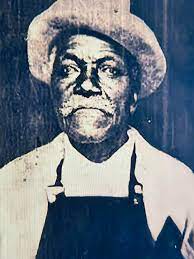What they never told us …
(BALTIMORE – October 10, 2025) – When scientists examined the DNA of Albert Perry, an African American man from South Carolina, they uncovered a genetic mystery that rewrote the history of humankind. Perry’s Y-chromosome — the strand of DNA passed from father to son — didn’t fit into any known category. It was older, far older, than all others on record.
The discovery, published in 2013, revealed that Perry carried what geneticists later called haplogroup A00, the oldest known male lineage ever identified — dating back more than 300,000 years. His bloodline diverged from all other modern humans long before the appearance of Homo sapiens as we know them. In other words, this South Carolinian, a man born into the legacy of slavery, carried within him the oldest genetic signature of the human race.
Subsequent research found that this ancient Y-chromosome lineage still exists among the Mbo people of Cameroon, confirming that Perry’s DNA wasn’t a fluke — it was a living remnant of humanity’s earliest fathers. His genetic code forced science to acknowledge that human history is far more complex than the textbooks suggest. It also reaffirmed what many in our community have been saying for generations: the story of Black people did not begin with slavery.
Connecting the Science to the Story
In our ongoing Indigenous Series on BMORENews and the Emmy-nominated Doni Glover Show, we’ve been asking the questions traditional history avoids. What if the origins of melanated people in the Americas predate the slave ships? What if the family stories of “Indian blood,” whispered by our elders, were never myths — but memories?
We’ve discussed haplogroups like E1B1A, common among African-descended men in the Americas. Scientists often link this group to ancient West African lineages, yet many of those same markers appear in unexpected places — among families with Native roots here in North America. The deeper you dig, the blurrier those colonial lines between “African,” “Indian,” and “Moor” become.
And that’s exactly what today’s genealogists, historians, and truth seekers are discovering. Through DNA testing, archival research, and oral history, a new generation is redefining identity. Some identify as Moors, tracing ancestry through the empires that connected Africa, Iberia, and the Americas long before Columbus. Others claim their roots as Hebrews, linking language, migration, and covenant traditions. Many more are reclaiming the term Indigenous, recognizing that the first peoples of the Americas looked far more like us than our history books admit.
From the Mounds to the Law Books
Our history runs deep — from the mound pyramids of Cahokia to the lost civilizations of the Mississippian cultures that built cities and trade networks rivaling those of ancient Egypt. These pyramids, numbering in the thousands across the Americas, challenge the notion that advanced civilization was a foreign import.
Then came the treaties, the Indian Wars, and laws like the 1740 Negro Act of South Carolina, which criminalized literacy among the enslaved and erased distinctions between “Negro,” “Indian,” and “mulatto.” That legal erasure was not accidental — it was policy. As we’ve explored in our series, even Freemasonic networks played roles in shaping the early treaties and land cessions that redefined who was counted as “Indian” and who was written out of history altogether.
Reclaiming the Narrative
So when we discuss Albert Perry, we’re not just talking about genetics — we’re talking about evidence. His DNA confirms what many of our ancestors knew without laboratories or peer review: that our story stretches beyond Africa, beyond slavery, beyond the imposed identities of race and color.
His discovery validates the mission behind the Indigenous Series — to create a space where science and spirit meet, where genealogy and oral history align. It proves that the Black experience in America is not merely a chapter in someone else’s history but a living continuation of an ancient, global lineage.
Perry’s Y-chromosome reminds us that human civilization didn’t begin in captivity; it began in consciousness — in the awareness that our ancestors walked this Earth long before the borders and categories that divide us today.
“Genealogy is higher than spirituality,” because knowing one’s bloodline reveals not just who we are, but how long we’ve been here.
Albert Perry’s DNA rewrote science. Our responsibility is to let it rewrite our understanding of ourselves. Whether you call yourself Moor, Hebrew, or Indigenous, the truth is this: our ancestors built, traded, prayed, and governed long before the ships arrived.
Through the Indigenous Series, we continue to explore that truth — challenging dogma, questioning records, and amplifying the voices of those rediscovering who they’ve always been.
Because if the world learned from Albert Perry that humanity is older than we thought, then maybe it’s time we realize that we, too, are more ancient — and more powerful — than we’ve been told.

